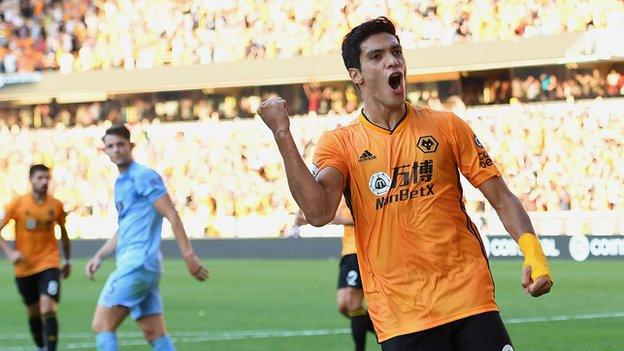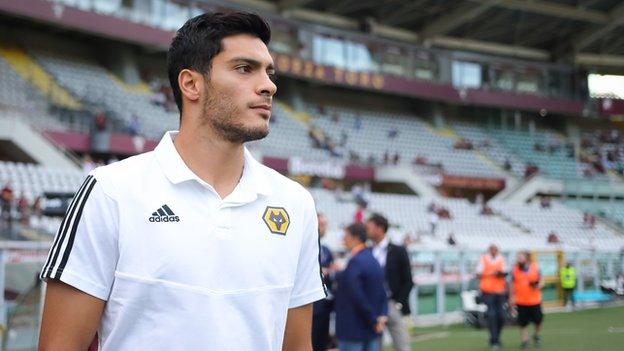Wolves: Can Nuno Espirito Santo's side cope with Europa League commitments?
- Published

Raul Jimenez, who scored a late penalty to clinch a draw against Burnley, is one of eight players in the Wolves squad with experience in continental competitions
"I think the travel is something special - too many games, too much travel - but we have to adapt."
Minutes after his dramatic stoppage-time penalty rescued a point for Wolves in a 1-1 draw against Burnley, Raul Jimenez is talking about the demands his team are facing this season as a result of their participation in the Europa League.
Nuno Espirito Santo's side started their competitive campaign on 25 July in the second qualifying round and have already clocked up more than 7,500 Europa League air miles - in addition to visiting China in pre-season for the Asia Cup.
They have still not guaranteed their place in the group stages, though they can do exactly that when they face Torino in the second leg of their play-off tie on Thursday, having won 3-2 in Italy last week.
Managing the challenges thrown up by a first European campaign in 39 years is a new experience for this Wolves side, while Sunday's opponents Burnley know only too well the damage it can do to domestic form.
Sean Dyche's side finished seventh in 2017-18 but lost four of their opening five games last season, were still in the bottom three at the start of January and ended up with 14 points fewer than they achieved 12 months earlier.
How Wolves are attempting to overcome the Thursday-Sunday 'slog'
Burnley's experience of struggling last season despite not even making the group stage - they were knocked out in the play-offs by Olympiakos - serves as a stark warning to Wolves.
While English sides have enjoyed success in the competition in recent seasons - the Premier League has supplied five finalists in the past seven years and two of the past three winners - there are others who have struggled to cope with its unique demands.
Hull City were relegated from the Premier League after competing in the Europa League qualifiers in 2014-15, while Everton's 2014-15 campaign in Europe's second-tier competition saw them suffer a 25-point deficit compared to the previous season.
Wolves are aware of these figures and have embraced sports science and state-of-the-art technology to ensure their season does not fall flat.
Their players had been in the air for around an hour following Thursday's win in Turin when preparations started for the game with Burnley.
During the three-hour flight back to the West Midlands, each player was fitted with a series of pads and electrodes to stimulate the main muscle groups and reduce the risk of flagging against the Clarets.
It worked.
Sixty-two hours after returning from Italy, and despite a far from polished performance in what was their third game inside a week, Wolves had enough energy to salvage a point thanks to Jimenez' spot-kick and extended their unbeaten start to the campaign.
Wolves embracing Europa League

Jimenez at the Stadio Olimpico Grande last Thursday before the Europa League play-off first leg against Torino which Wolves won 3-2, three days before their 1-1 draw with Burnley
While Jimenez spoke of the physical problems that arise from the competition, one former player with Europa League experience says the issues are more wide-ranging.
"The early stages of the Europa League are a nightmare," ex-England and Manchester City defender Micah Richards told BBC Radio 5 Live.
"I've been to places that I don't even know how to spell the name of. As a player, you want to play in the big games so if you are playing against someone you have never heard of, I'm not going to say your standards drop, but you don't look forward to it as much as a big game."
Yet Wolves have embraced the competition.
After beating Northern Ireland's Crusaders in their opening tie, they have since demolished Pyunik Yerevan - each of the 48 Wolves fans who made the 6,000-mile midweek round trip to Armenia's capital received a letter from captain Conor Coady - before being paired with Torino for a place in the group stage.
But the club's first European campaign in almost four decades has not been without the odd hiccup - despite five wins out of five.
Spanish winger Adama Traore arrived at the airport for the flight to Armenia without his passport and missed the first leg. It mattered little as Wolves triumphed 4-0 on their way to an 8-0 aggregate win.
One fan, die-hard supporter Steve Bishop, was only able to see the last 18 minutes of the match in Armenia after his flight was delayed.
But the novelty for the fans - and the potential the tournament offers for such an upwardly-mobile club - means the mood is one of positivity around Molineux.
"We want to embrace the Europa League and compete in all the competitions we are in," said Nuno.
Can Wolves cope with the increased workload?
Wolves do not have squad depth such as that boasted by Premier League rivals Arsenal and Manchester United, who are appearing in the group stage.
Nuno started just 18 players on the way to finishing seventh in the Premier League last season and half of them - Ryan Bennett, Willy Boly, Coady, Matt Doherty, Jimenez, Jonny, Joao Moutinho, Ruben Neves and Rui Patricio - started 30 games or more.
This season they are operating with a 21-man squad - something lifelong Wolves fan Steve Burt believes will be an advantage rather than a hindrance.
"Obviously being a small squad means we are a tight-knit squad and we don't have players sitting on the sidelines not getting games, starting to spread bad feeling among the squad," said Burt.
"The medical and sports science teams are absolutely superb and that is helping us to avoid injuries because we go about our training in the right way.
"There was a fantastic television documentary about Wolves' tour to China in the summer and how they analyse the sweat each player loses, so when they are coming off the field every player has their own individual diet or drink to replenish.
"It really is down to the finest detail. Nuno's DNA runs throughout the club."
One factor likely to help them is the fact their squad is sprinkled with players with European experience: Patricio, Boly, Jonny, Moutinho, Neves, Leander Dendoncker, Jimenez and Diogo Jota have all played in continental competitions previously.
The same could not be said for Burnley this time last year...
Burnley flourishing without European distraction
Claiming seventh spot and a shot at the Europa League qualifiers turned out to be a mixed blessing for the Clarets last season.
The play-off exit meant their first European adventure in half a century was over by the end of August.
Striker Peter Crouch, who joined them in January, remembers players chatting about the experience of playing in the Europa League.
"They said the start that Burnley had was not something they were used to and their form was was definitely down to the Europa League," Crouch told BBC Sport.
"Sean Dyche does not like to change his starting XI around much, whether that is the Premier League or Europe, so that is a lot for the players to take on. It was a bit of a shock to some and definitely hindered the start to their season.
"You can make excuses about Europe but seeing Wolves against Burnley, they looked a little flatter having played Monday and Thursday nights.
"It will prove difficult and for some reason it is very hard to replicate form in the Europa League and Premier League."
With no European distractions to worry about this time around, Burnley have made a solid start and have four points from three games - last season it took them six games to reach that tally.
"We're looking a different animal to last season, which is important at this early stage," said Dyche.